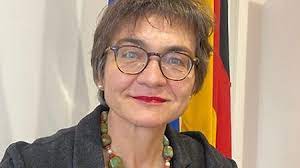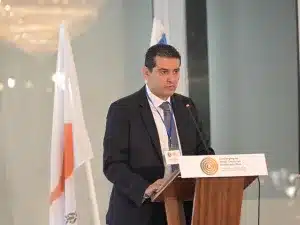On Wednesday, 17 April 2024, the German Ambassador to Cyprus, Anke Schlimm (pictured above) will officially present Professor Dr Nikolaos Zamboglou with the Cross of the Order of Merit of the Federal Republic of Germany for his many years of service and outstanding achievements in the field of medical care.
By founding the German Oncology Centre, he has not only improved cancer treatment in Cyprus, but also strengthened the ties between Cyprus and Germany. Federal President Frank-Walter Steinmeier presented Professor Zamboglou with this prestigious award for his outstanding contribution to German-Cypriot relations in the field of medicine. The official award ceremony will take place at the residence of the German Ambassador.
Professor Zamboglou, born in Limassol in 1949, studied physics at the RWTH Aachen University from September 1966 and obtained his doctorate in physics at the Institute of Medicine at the Jülich Research Centre of the University of Düsseldorf in 1977.
As a research assistant at the Institute for Radiation Biology and Physics at the University of Essen, he studied medicine from 1979 and worked as a junior doctor in radiotherapy at the Alfred Krupp Hospital.
After obtaining his doctorate in Essen in 1987 and his habilitation in Düsseldorf in 1989, he worked as a specialist in radiotherapy and senior physician at the University Hospital of Düsseldorf before taking up the position of Chief Physician at the Sana Clinic in Offenbach in 1992. He was President of the German Society of Radiation Oncology from 2003 to 2005. After 24 years, Professor Zamboglou left the Offenbach hospital in 2016 as head of the Clinic for Radiotherapy and Radiation Oncology. He returned to Limassol, where he founded the German Oncology Centre in 2017 and has been its medical director and CEO ever since.
With the establishment of the centre, Professor Zamboglou aims to provide all citizens of Cyprus with the same high standard of medical care that he previously provided in Germany, using the experience and expertise he gained in Germany over 50 years.
He has also expressed his attachment to Germany by naming the German Oncology Centre after it. It is important to him that Germany is not only in the name of the clinic, but that the German model is also deeply rooted in the culture of the clinic. For example, 90% of the clinic’s department heads graduated from medical school in Germany, and many other clinicians have studied in Germany.
The equipment used in the clinic is all German brand, and the clinic voluntarily submits to the strict German radiation protection standards. As a result, the clinic enjoys an excellent reputation among the people of Cyprus and internationally and is generally perceived as a “German hospital” due to its high medical and technical standards, which have enabled it to achieve a level of medical care that is known in countries larger than Cyprus. Professor Zamboglou therefore describes the German Oncology Centre as “a piece of Germany at the end of Europe”. The humanitarian commitment of the private clinic deserves special mention.
Founded as a modern centre of excellence for cancer diagnosis, the centre is currently in an expansion phase that will significantly increase its range of highly specialised treatments and services.
The main areas of expertise are: radiotherapy and radiosurgery; brachytherapy, interventional radiation oncology and iridium knife; diagnostic and interventional radiology; medical oncology and haematology; nuclear medicine and theranostics; internal medicine; medical physics; interventional cardiology; endoscopy; gastroenterology and pneumology. Wards for gynaecological check-ups, integrated medicine, outpatient surgery and intensive care, as well as a pain clinic complete the range of services. The German Oncology Centre in Limassol is integrated into the Cypriot national health system GeSY | GHS and maintains numerous links with Germany that go far beyond the name of the clinic. It stands for the high reputation of the Federal Republic of Germany as a country of scientific progress in the field of health and thus fulfils the quality expectations placed on it.



















